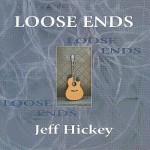 JEFF HICKEY – Loose Ends
JEFF HICKEY – Loose Ends
Written by Jamie
Classic folk music makes prison sound romantic. Going to jail is not something to which most people aspire, mind you, but there’s something about well-played acoustic guitar that makes doing time seem poetically grand.
Jeff Hickey makes folk music sound incredible. Whether listeners to his new album, Loose Ends, will spend time behind bars is debatable, but the quality of Hickey’s music is not. Loose Ends plays like a primer for modern folk musicians, paying homage to the instrumental giants of the genre with intricate guitar arrangements while staying lyrically relevant. Hickey even includes detailed liner notes about each song’s conception.
Hard luck prevails on the album, which includes tales of mass murder, business collapse, prison (of course), political unrest, and relationships gone bad. Hope is not lost, however, as the single life can be good, love is ultimately requited, and family life generates fresh visions of the world. Interspersed are three instrumentals of varying styles that are, like life, as complicated as they are beautiful.
Hickey’s guitar playing is nothing short of inspired throughout, and his voice is perfectly suited to his chosen genre. Written and refined over the past twenty years, Loose Ends is one of those rare albums in which the superfluous has been eliminated and every song is enjoyable.
Especially notable are “Columbus Stockade” and “Long Beach Birthday Blues”. The former is a strikingly lovely rendition of a folk standard, played in a minor key rather than the traditional major. The latter is a “navel-gazing song” reminiscent of early Jimmy Buffett that does not suffer for having less-than-monumental subject matter.
In the introduction to Loose Ends, Jeff Hickey mentions that he considered titling the album Greatest Hits despite the fact that it is his first release. The comment would be somewhat narcissistic if not for the fact that this twelve-track collection is so solid. A definite must-have, even for those who usually have no affection for either folk music or the penitentiary.















Comments are closed